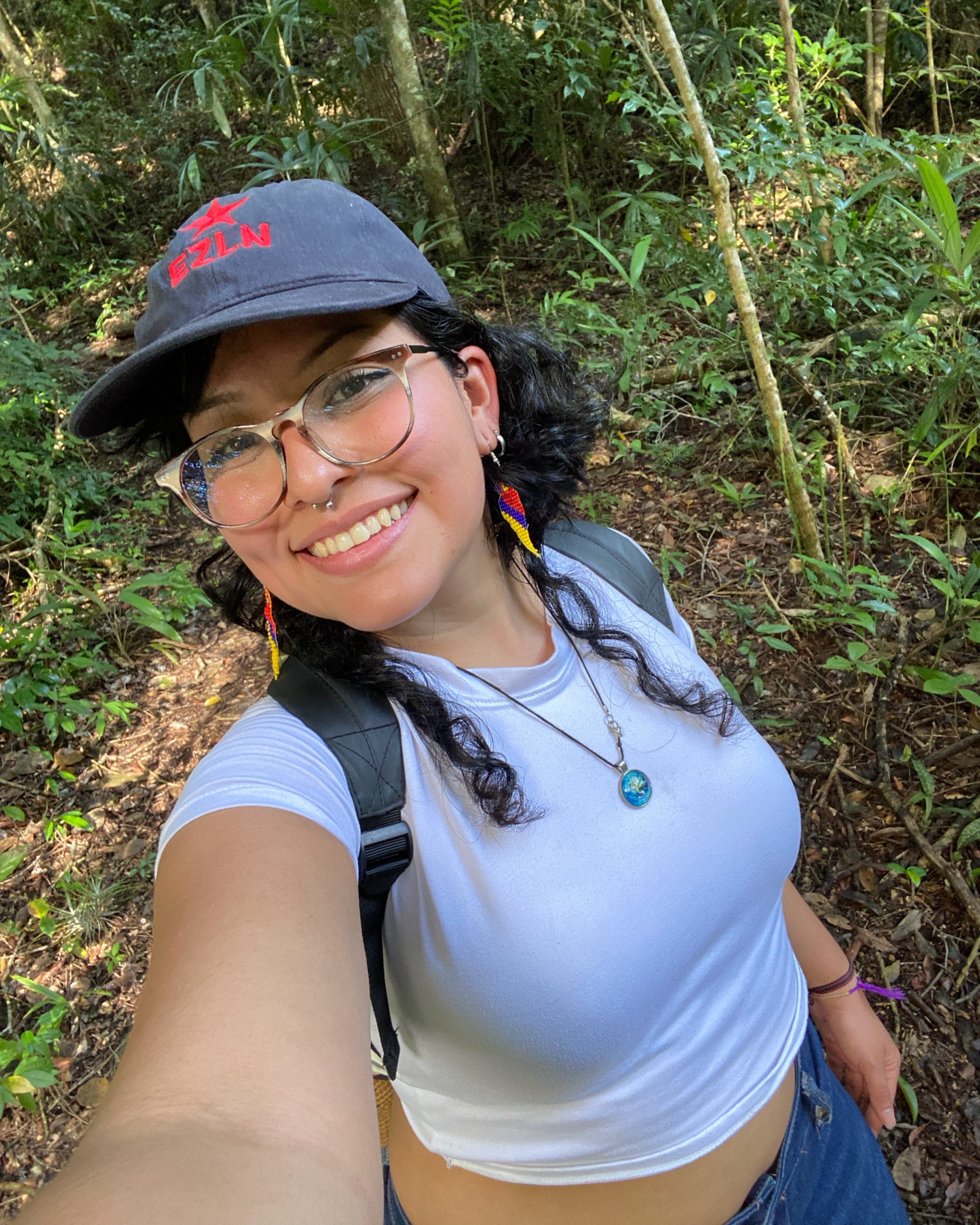By Sacnité Acosta Hernández ![]()
Co-founder and co-leader of LEGAIA
Fatima Ochoa Morales ![]()
Member of LEGAIA
The world we live in today thrives on caregiving. The work of caregivers is crucial for the survival of society.
According to the International Labor Organization, there are 381 million caregivers. Many of them perform domestic tasks that allow others to focus on production, meet broad health needs, and promote development processes. Unfortunately, the capitalist system often ignores and violates caregivers by failing to guarantee them fair labor rights, prioritize their care, and recognize the vitality of their work.
In Mexico alone, unpaid care and support work within homes performed by 31.7 million caregivers contributes approximately 26.31% of the national GDP (INEGI, 2024). Considering the current poor conditions surrounding caregiving and the people involved in it, we cannot continue to ignore them without demanding that the relevant authorities establish a comprehensive national care system that dignifies the work, value, and lives of caregivers.
As women, young people, and activists, we are aware of the important role that care plays in our lives, especially as we become adults, due to the historical imposition of gender roles in society. In a single day, we can take care of our family, our home, our work environment, the people we connect with, and ultimately, we take care of ourselves. Therefore, caregiving has always been present in our lives, directly or indirectly, as caregivers and as recipients of care.
On the other hand, by dedicating ourselves to activism, we exercise a broader and more collective form of care focused on a cause. We are caretakers of the environment, the climate, and the life we constantly resist on different fronts. At the same time, we care for the people who make up our collective, the collective space, and the alliances we have forged through work and struggle over time. This has led us to prioritize, both individually and within the collective, self-care and caregiving in order to maintain the holistic well-being that allows us to continue existing and resisting. We know that a world without care and caregivers would be unsustainable, unjust, and violent.
At LEGAIA, we consider care as the foundation of our collective's work and struggle. Rather than fighting the climate crisis and extractivism, rather than weaving together other territorial resistances, LEGAIA is a support network that seeks to champion climate activism through political friendship and collective care.
Those of us who join the struggle for land, climate, and life are sensitive to the injustices and multiple forms of violence that extractivism and capitalism have brought to communities, peoples, and our lives. We understand that existing within the capitalist system forces us to experience the various forms of violence that permeate us. Thus, our struggle contradicts the individualistic system and is in itself a form of care work. Therefore, the situations we, as part of this movement, experience—such as unpaid volunteer work, anxiety and depression when addressing the issues we address, and any risk factors that our struggle entails—lead us to perceive our collective as a plural and collective space of care.
When we in movements propose radical imagination, there is someone who convenes the spaces for our ideas to emerge. When we say we must fight with joyful rebellion and resist through celebration, there are those who organize meetings, clean, organize, and check that everyone arrives safely. When we seek to organize rage and fight with resistance, there are those who facilitate assemblies, take minutes, and follow up; they listen to feelings and thoughts, help resolve conflicts; they monitor and protect protests, observe and document any human rights violations, and speak out against the injustices they perceive.
Therefore, we believe that care in the climate movement, and in any space of social struggle, must be shared and recognized collectively. Because without care and no one to provide it, no form of resistance would be possible.
In this sense, thanks to the constant presence of caregiving in our environment, we have valuable tools to collaborate in the Forum on Youth Voices in Caregiving for the development of public policies. This dynamic was very valuable because, despite experiencing caregiving on a daily basis, certain aspects often go unnoticed by both us and society. Thus, this space helped us recognize the importance of caregiving and understand how other young people experience or work with it. However, we also identified the negative aspects that fall on us without being resolved or prevented.
Although progress was made in addressing this issue during the Forum, the conversation surrounding it is much more complex. Therefore, to develop an effective political action plan that truly reflects our needs as young caregivers, dialogue between youth and authorities must be deepened. The transition to a comprehensive and dignified care system must focus on women, gender dissidents, and youth to compensate for their historical invisibility in this regard.
Although caregiving is necessary to sustain life, the caregiving we youth often provide occurs within a capitalist, racist, colonial, and patriarchal framework, as we live in such a system. At the Forum, we addressed how youth neglect important areas of our lives, such as our academic education, recreation, and rest, in order to perform caregiving tasks that occur in a context where many jobs require more than 48 hours a week (some of these jobs are caregiving in and of themselves, such as those in the healthcare or education sectors).
We also pointed out that, due to gender, women are the ones who dedicate more hours to care work, causing many of us to work double or triple shifts each day. We recognized that the differences are even greater when we talk about those who live on the outskirts of Mexico City or the State of Mexico and how factors such as the transportation system, the centralization of jobs and services, insecurity, and access to water increase the unequal conditions under which care work occurs.
We believe that the proposals for a National Care System, for increasing the number of UTOPÍAS (Utopias), for working together with the National Youth Institute, and for improving employment and housing programs are undoubtedly a promising starting point for the Mexican government toward a more just society where caregiving is at the center. However, we also believe that no matter how feminist and caring the government's strategy claims to be, if it continues to be one that places economic development and growth at the center, it will continue to be a structure that perpetuates the same capitalist system that continues to oppress those of us who perform caregiving work.
Thus, we believe that without including youth, women, gender dissidents, social movements, and organized communities, care work will not be truly recognized. Care work is very broad and can be presented in implicit or explicit, and in a dispersed manner. At the same time, the people who provide care can be very different from one another, with different motivations and rewards. Therefore, it is imperative that both society and government agencies recognize this in order to develop public policies that truly understand and prioritize care, caregivers, and those who receive care.
The National Care System must focus on the needs and well-being of the people involved in care to be effective. Life is about the acts of care we perform for others from a place of tenderness and support. Caring for each other in an individualistic and harmful world is an act of resistance. Care networks are what sustain people and life.
Sources:
International Labour Organization. (2018). Care Employment and Care Work. https://www.ilo.org/es/temas-y-sectores/economia-del-cuidado#what
National Institute of Statistics and Geography. (2024). Unpaid Household Work. INEGI. https://www.inegi.org.mx/temas/tnrh/
NOTE: LEGAIA or Gaia Legacy is a youth collective that is part of the climate justice movement in Mexico. Since 2021, it has been fighting the climate crisis at its root: the capitalist-extractivist system. To this end, it weaves territorial resistance from the cities through three areas: territorial action, capacity building, and political advocacy with projects such as Siembra Esperanza Climática, which seeks to implement community urban gardens for climate action; Escuelitas para la Vida, which seeks to train youth and communities on the tools of the Escazú Agreement as a way for those defending their territory to exercise their rights; and the Mesoamerican Caravan for Climate and Life, a joint action with other territorial and human rights defense collectives, which travels across territories in defense of territories from Mexico to Brazil within the framework of COP-30.






